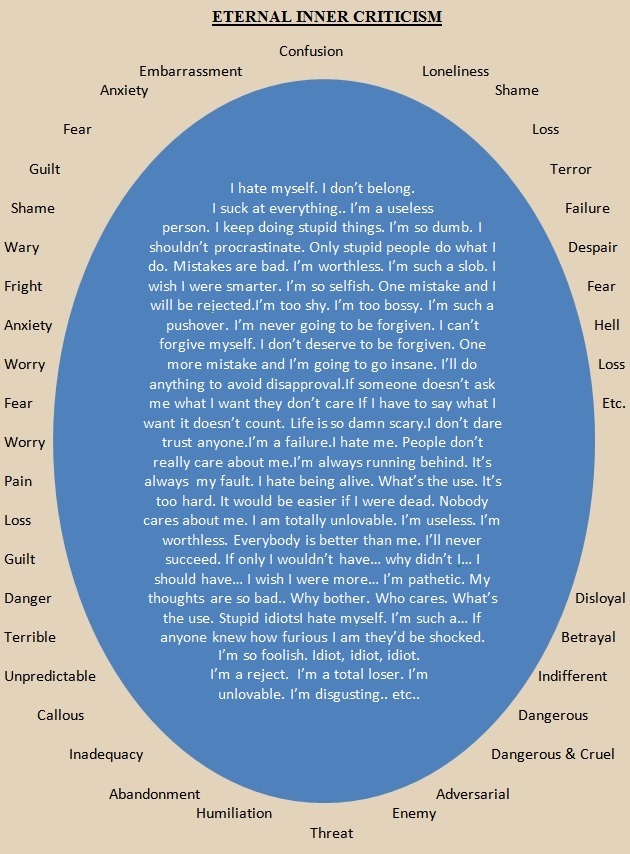Automatic Self-Talk—Not the Friendliest “Voice” in Town
We need to become conscious of this thing that has been called “self-talk.” If you take 15 seconds to listen to this internal monologue that goes on in our brain you will discover that it is automatic and it is actually unlikely that we are generating it. Consider that if we were the source of it, if we were generating it, then it stands to reason we would know how to stop it, we would know where the shut-off valve is. Nobody has found it because the valve doesn’t exist.
I would also ask you to consider that this “self-talk” begins to operate in our brain when we are approximately 12-15 months of age. During this time the process is neutral; that is, we are taking in new information, learning to distinguish sounds and words (an ability which actually began in the womb), beginning to learn and process both the receptive and expressive sides of our language ability. We are fully immersed in learning to understand what is being said and how to say it. By the time we are six years old, we have faced many developmental challenges (e.g., feeding ourselves, sitting up, crawling, walking, toilet training, exploring our environment, going to preschool or kindergarten). During this time our brain internalizes these same attitudes and mannerisms which originated in external sources (e.g., parents, relatives, teachers). Our brain mimics what is heard and experienced.
Every brain has this operational mechanism. If you are human, you have
a brain and—like it or not—your brain is not the exception to this rule.
Therefore, you have this operational mechanism. And—like it or not—this
mechanism within your brain has no off-switch and will be—until your brain
ceases to function—as constant as your shadow in the sun.
The degree to which we experience physical and emotional assurance, the degree to which we experience verbal encouragement is the degree to which we feel a sense of physical comfort and trust; independence, autonomy, and competency. Likewise, the degree to which we face harsh disapproval—physically, emotionally, verbally—is the degree to which we will feel mistrust, shame, doubt and guilt and inferiority—all of which get reinforced by the brain’s capacity to internalize and mimic that which is originally external.
There is an additional component to this mechanical mechanism. If you will take a moment and listen once again to this inherited mechanism (no more than 15 seconds is needed) you will discover this 24/7/365 monologue is only and always only 1) judging, 2) assessing, or 3) evaluating. For example, you may hear something like, “I don’t understand, why only 15 seconds… 15 seconds is too long… this is stupid… what mechanism?… my nose itches”… etc.. If you examine this stream of thought you will discover that it is a never-ending stream of commentary.
There is a tendency to think that this “inner voice” (which at best is demeaning and at worst vitriolic) will motivate us (e.g., “you could do better,” “if only I would have,” “next time I must,” etc. etc., etc.). But the reality is that if that were true, we would only need to hear them once and we’d feel the graceful impact of empowerment and encouragement upon our actions and emotions.
Immediately below, you will see a conceptualization of these automatic mechanical thoughts. Outside the circle are undistinguished presuppositions about the nature of life (again, based in more judgments/assessments/evaluations).

Here’s another way to capture the essential facet of this eternal inner criticism:

The constant automaticity of this critical monologue leaves us feeling shamed and guilty, discouraged, defeated and emotionally bruised.
This monologue and its impact are both abusive.
Just as we are not entitled, nor given a legal right, nor a just claim, nor any authorization to be abusive to any individual, so too we are not entitled to, nor given a legal right, nor just claim, nor any authorization to abuse ourselves. Given we are not entitled to be abusive toward ourselves and given we cannot turn off this very mechanism which so greatly disturbs us, is there still any way of being that can deflect this mechanism’s impact upon us and upon our inner equanimity which we so sorely miss?
There is a practice to adopt, to begin to use daily. And to best understand it let us think of this automatic mechanization of the brain as an ox, an ever-present ox, an unruly ox-a creature whose brutish nature and indiscriminate use of sharp horns must be tamed. Taming the bull, disciplining the bull, requires a constancy of intent which at first we do not have. It is the practice itself (as described below) that creates the constancy of intent. Here is one such practice:
- It is not important whether you begin by taking on this practice for 15 seconds a day, or 1 minute a day, or 2 minutes in the morning, 2 in the afternoon, 2 in the evening, 2 at night. What is important is that you begin the practice. Remember, any thoughts you hear regarding this process while you are doing this process are mechanical. It is the machinery wanting to maintain the status quo of its operation.
- Say to yourself: “Stop” or “No” or “Wait. There is no condition under which I am entitled to assassinate my character or to be abusive.”
- If it is helpful either literally or within your imagination extend your hand in a stopping gesture to get your attention and repeat, “stop” or “no” or “wait.”
- Doing so is like stopping your car at the stop sign. The stop sign does not stop the car. You do. And you may not want to stop the car, but stopping the car, or taming the ox requires that you apply the brakes or pull on the ox’s halter.
- In your own words (or feel free to borrow these) say (out loud is best but if said silently listen with intent): “I am willing to listen to anything there is to say to myself…anything. From the sublime to the mundane, to the profound to the profane, to the most vulnerable, to the silliest, to the most fearful, to the most embarrassing, to the most frightening…I am willing to listen to anything I have to say to myself—absolutely without any exceptions.”
- Then say, “It must be said respectfully, no shoulda, coulda, woulda, etc.” (Refer to diagrams above).
- One of two experiences will occur:
- Your mind for a moment or two will be very quiet; or
- You will find a loophole in the above stop sign diagram and proceed with abusive thoughts. If that is the case, please add that thought mechanism into the diagrams and return to step 1.
- One of two experiences will occur:
- Ask yourself the following two questions:
- What am I feeling right now? (See the last two pages for assistance in identifying feelings). If you know, name and accept the feeling…or accept you don’t accept the feeling. If you don’t know, tell yourself, “I don’t know YET.” The word “yet” leaves you with the possibility that you can and will now at some other time in your future.
- What do I need right now? If you know what you need, name and accept the need and name the steps needed to fulfill the need. If you don’t know add the word “yet” and tell yourself, “I don’t know YET.”
For the time being, that is all there is to do. The focus is not on the results. The focus is not on changing the machinery. When you find yourself focusing on that (which you will), return yourself to the practice of intervening (just as a referee intervenes in the game when a foul has been committed). The focus is an intention practice of stopping in moment the abusive machinery and inviting yourself to begin an intimate respectful conversation.
